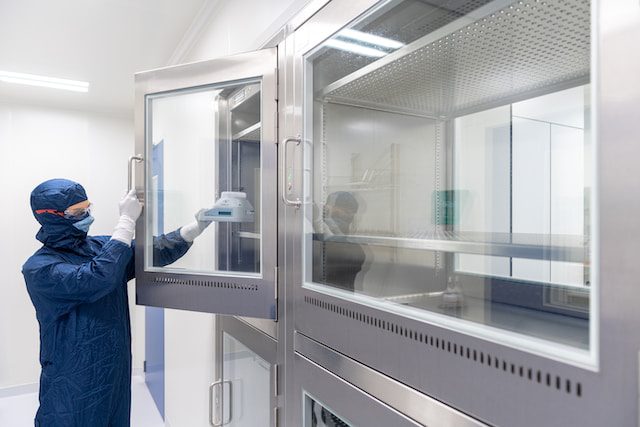The pharmaceutical industry is a vital sector that develops and manufactures drugs, vaccines, and other medicinal products that have the potential to save lives. However, the efficacy and safety of these products are dependent on strict adherence to quality control standards throughout the development, manufacturing, and distribution process.
One crucial factor in this process is temperature control. Temperature-sensitive drugs can be rendered ineffective or even harmful if they are not stored and transported under appropriate conditions. Therefore, the importance of refrigeration in pharmaceutical manufacturing and storage cannot be overstated.
Refrigeration technology has revolutionized the pharmaceutical industry by providing a means to maintain the appropriate temperature ranges for temperature-sensitive drugs, vaccines, and other medical products. Without proper refrigeration, these products could easily deteriorate, leading to lost efficacy or even patient harm.
The criticality of refrigeration in pharmaceutical development and storage has spurred advancements in refrigeration technology, including improved temperature control, monitoring, and energy efficiency. These advancements are essential to ensure that pharmaceutical products remain safe and effective, as well as reducing energy costs and environmental impact.
Why Refrigeration is Important in Pharmaceutical Development
Refrigeration plays a crucial role in the development, manufacturing, and storage of pharmaceutical products. This is especially true for biologics, which are drugs produced from living organisms and are highly temperature-sensitive. Maintaining the appropriate temperature range is essential for ensuring the safety, efficacy, and quality of these products.
Preservation of Active Ingredients
Refrigeration helps preserve the active ingredients in temperature-sensitive drugs, preventing degradation and ensuring product efficacy.
Reduced Microbial Growth
Refrigeration slows down microbial growth in drugs and raw materials, reducing the risk of contamination and ensuring product safety.
Extended Shelf Life
Refrigeration helps extend the shelf life of pharmaceutical products, reducing the risk of product spoilage and waste.
Refrigeration in Pharmaceutical Development
Raw Material Storage
Raw materials used in pharmaceutical manufacturing must be stored in appropriate conditions to maintain their quality. Refrigeration helps prevent degradation and ensure product efficacy.
Drug Formulation and Production
Many drugs require specific temperature ranges during production to maintain their quality. Refrigeration is crucial in these processes to ensure that the drugs are produced correctly.
Packaging and Distribution
Pharmaceutical products must be packaged and distributed under appropriate temperature conditions to prevent degradation and ensure product efficacy. Refrigeration is crucial in maintaining these conditions.
Refrigeration in Pharmaceutical Storage
Temperature Control in Warehouses
Pharmaceutical products must be stored in temperature-controlled environments to maintain their quality. Refrigeration is crucial in these warehouses to ensure that the products are stored at the correct temperature.
Transportation of Temperature-Sensitive Products
Refrigerated transport is essential for temperature-sensitive pharmaceutical products. It ensures that the products are transported at the correct temperature, preserving their quality and efficacy.
Compliance with Regulatory Standards
The pharmaceutical industry is heavily regulated to ensure product safety and efficacy. Refrigeration is essential in complying with these standards, and failure to do so can result in severe penalties and reputational damage.
Future Trends in Pharmaceutical Refrigeration
Advancements in Refrigeration Technology
The pharmaceutical industry is constantly evolving, and advancements in refrigeration technology are being made to improve the storage and transportation of pharmaceutical products. Temperature control is a critical aspect of pharmaceutical manufacturing and storage, and recent developments in refrigeration technology have focused on enhancing temperature control and monitoring capabilities.
One of the key innovations in refrigeration technology is the use of digital sensors and monitoring systems that can measure temperature variations in real-time. These sensors can provide accurate information about the temperature of the products being stored or transported, allowing for precise adjustments to the refrigeration system to maintain optimal temperatures.
Energy efficiency is also an important consideration in the development of refrigeration systems for pharmaceuticals. These systems are designed to operate continuously, which can result in significant energy consumption. As a result, there is a growing focus on developing more energy-efficient refrigeration systems that can reduce the environmental impact of pharmaceutical production and storage.
Overall, the advancements in refrigeration technology are helping to improve the safety, efficacy, and quality of pharmaceutical products by ensuring that they are stored and transported under the appropriate temperature conditions. The development of more sophisticated refrigeration systems will continue to be a crucial area of focus for the pharmaceutical industry as it strives to meet the growing demand for temperature-sensitive biologics and other pharmaceutical products.
Increasing Demand for Biologics
Biologics are a type of drugs that are made from living organisms, such as human or animal cells. They are used to treat a wide range of diseases, including cancer, diabetes, and autoimmune disorders. Unlike traditional drugs, which are synthesized from chemicals, biologics are more complex in their structure and require specific conditions for storage and transportation. They are highly sensitive to temperature changes and can become ineffective if not handled properly.
The increasing demand for biologics has led to the development of more sophisticated refrigeration systems that can maintain the required temperature ranges for these products. The storage and transportation of biologics require precise temperature control, usually between 2 to 8 degrees Celsius, to ensure their efficacy and safety. Any deviation from this temperature range can result in product degradation or loss of potency, which can have serious consequences for patients.
The development of new refrigeration technologies, such as cryogenic cooling and supercritical fluid cooling, is also helping to improve the storage and transportation of biologics. These technologies provide more efficient and precise temperature control, reducing the risk of product degradation and loss of potency.
Conclusion
Refrigeration is an essential component of pharmaceutical manufacturing and storage. It helps maintain product quality, extend shelf life, and ensure compliance with regulatory standards. Advancements in refrigeration technology are driving improvements in the industry, making it easier to maintain the required temperature ranges for temperature-sensitive products.
Overall, the role of refrigeration in pharmaceutical manufacturing and storage is crucial, especially for biologics. The increasing demand for these products is driving the development of more sophisticated systems by refrigeration components manufacturers that can provide precise temperature control and monitoring, ensuring the safety and efficacy of these life-saving drugs.
